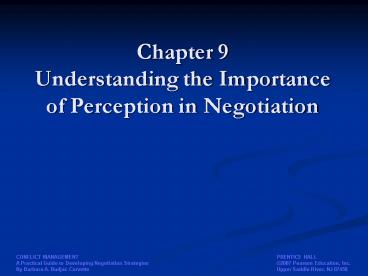Chapter 9 Understanding the Importance of Perception in Negotiation - PowerPoint PPT Presentation
1 / 27
Title:
Chapter 9 Understanding the Importance of Perception in Negotiation
Description:
By Barbara A. Budjac Corvette. We create cognitive structures to organize what we perceive. ... By Barbara A. Budjac Corvette ... – PowerPoint PPT presentation
Number of Views:2655
Avg rating:3.0/5.0
Title: Chapter 9 Understanding the Importance of Perception in Negotiation
1
Chapter 9Understanding the Importance of
Perception in Negotiation
2
Perception
- The process of selecting, organizing, and
interpreting stimuli.
3
Everyone Does Not See the Same
- Personality affects perception.
- Culture affects perception.
- Attitude affects perception.
- Context affects perception.
4
- We perceive everything and everyone everyday.
- Person perception is the most complex.
- Perception affects all that we do.
5
- We create cognitive structures to organize what
we perceive. - The structure may be thought of as a file
cabinet. - Extroverts use fixed cabinets.
- Introverts use abstract cabinets.
6
Sensors and Intuitors Perceive Differently
- Sensors seek validity in things that can be
verified by physical senses. - Intuitors seek the unusual and creative and see
validity in things consistent conceptually. - Sensors organize stimuli according to experience.
- Intuitors organize according to conceptual
relationships.
7
We Attribute Psychological Processes to Others
- We view people as causal agents.
- We infer intentions and attitudes of others.
- We expect experience to repeat.
- We make judgments about the purpose of others
behavior. - We assess blame and culpability.
- We assess validity.
8
- We tend to assume that others are like us.
- We tend to think others perceive as we do.
- We tend to think others think like we do.
9
Attribution Theory
- We evaluate validity of messages to acquire valid
attitudes. - We attribute cause for communication.
- Cause may be attributed to external or internal
sources.
10
- In assessing or attributing cause, we assess
three things - Consistency
- Consensus
- Distinctiveness
11
- Consistencywhether the behavior or communication
is consistent with prior experience with THAT
individual in similar situations. - Consensuswhether the behavior agrees with that
of OTHERS in similar circumstances. - Distinctivenesswhether the behavior is different
from prior experience generally with THAT
individual.
12
Decision Tree
- Consistent? No. Attribute to external causes.
- Consistent? Yes. Check Consensus.
- Consensus? Yes. Attribute to external causes.
- Consensus? No. Check Distinctiveness.
- Distinctive? Yes. Attribute to particular
external causes and internal causes. - Distinctive? No. Attribute to internal causes.
13
External/Internal Causes
- We afford greater validity to behavior attributed
to external causes. - We do not hold others responsible when we
attribute their behavior to external causes. - We DO hold others responsible when we attribute
their behavior to internal causes. - Our biases and prejudices are activated in our
attribution process.
14
Fundamental Error
- The fundamental attributional error made by all
is to tend toward attributing behavior to
internal causes. - The error accounts in part for our tendency not
to believe others. - We do not make that error in assessing our own
behavior. We have a self-serving bias.
15
Attribution in Negotiation
- This unconscious process impacts negotiation in
at least three ways - It influences whether or not we see a conflict.
- It influences our choice of conflict strategy.
- It influences our assessment of potential
outcomes.
16
Chapter 10Effects of Power in Negotiation
17
Power in Negotiation
- Personal power is the most critical power.
- Personal power comes from knowing oneself.
18
Types of Power
- Legitimacyreal, perceived, or imaginary
- Positiona form of legitimate power
- Expertisereal or perceived
- Rewardreal or imaginary
- Coercivereal or imaginary
- Referentthe power of making others want to be
like you. - Situation
- Identificationcommonalities that draw people
together - Popularity or the Power of Needs
- Persistence
- Patience
19
Real Versus Perceived Power
- Most powers must be permitted or enabled.
- Real coercive power is an exception.
- If someone can really hurt you, negotiation is
risky.
20
Using Power
- Power used aggressively or to pressure,
intimidate, or manipulate is to apply power-over
tactics. - Power given to or shared with others is to apply
power-to tactics. - Power-over tactics are divisive or destructive.
- Power-to tactics are constructive.
21
Power-To and -Over Examples
- Reasoningpower-to
- Tradingpower-to
- Friendlinesspower-to
- Feigned friendlinesspower-over
- Drawing coalitionspower-to or power-over
- Going to high authoritypower-over
- Giving sanctionspower-over
22
- Sometimes a person who perceives him/herself as
powerless will employ power-over tactics. - A powerless person has nothing to lose and is
unpredictable.
23
Psychological Games
- Psychological maneuvers and stratagems are
intentional patterns of behavior designed to
manipulate others. - Maneuvers are brief.
- Strategems are prolonged.
24
- Con games seek immediate tangible results.
- Head games seek emotional effects intended for
ultimate tangible gain. - Remember that most power does not exist unless
you let it!
25
Reactance Theory
- Reverse psychology is the common name for
pretending to withhold something on the
assumption that we all want what we cant have. - It is risky, but sometimes effective.
26
Bluffing
- Lying?
- A psychological Game at best.
- If you bluff, dont get caught!
27
- Let us never negotiate out of fear, but let us
never fear to negotiate. - John F. Kennedy































